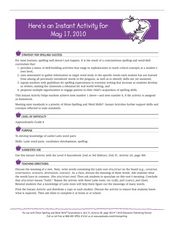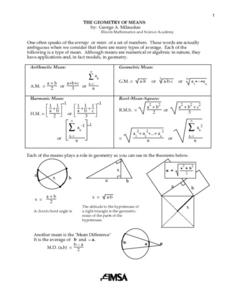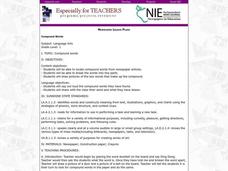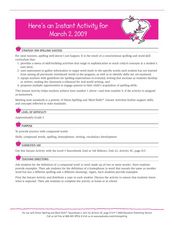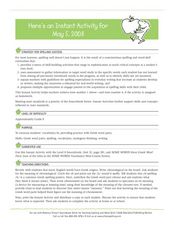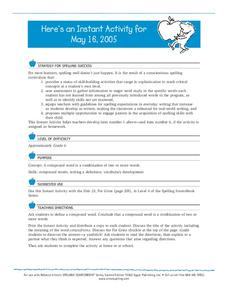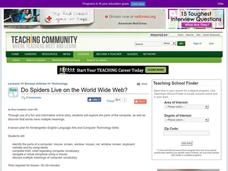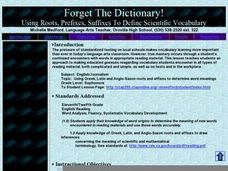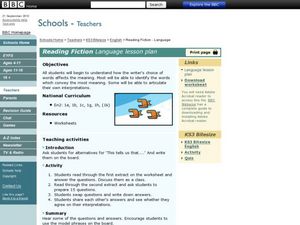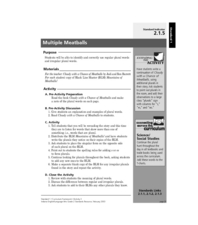Curated OER
Reading Word Recognition, Fluency, and Vocabulary
Eleventh graders analyze words that derive meaning from Greek, Roman, and Norse myths. In this myth vocabulary lesson, 11th graders work in learning groups as visual learners, kinesthetic learners, and artistic learners to identify the...
Curated OER
Roots
Young scholars are introduced to Latin and Greek roots, prefixes, and suffixes. They are given a lesson on ten root words that students identify the correct meaning of the words. Young scholars design cards that are divided into four parts.
Curated OER
Exploring Latin Word Parts
Fourth graders complete a worksheet. In this root words lesson, 4th graders discuss the meaning of a root. Students view words with the Latin root stru/struct and discuss their meaning. Students repeat this process with other Latin root...
Curated OER
The Geometry of Means
For this geometry worksheet, students are given a rectangle and a square. They verify ratios when given equal perimeters or areas. Students are given adjacent squares. They find the distance between the centers, and identify the means...
Curated OER
Compound Words
First graders read newspaper articles and locate compound words. They break the words into two parts, then draw pictures of the two words.
Curated OER
Practice With Compound Words and Homophones
Third graders work with compound words. In this compound word lesson, 3rd graders define and give examples of compound words and homophones. They complete an Instant Activity worksheet.
Curated OER
Some Words Have Greek Word Parts
Ninth graders complete spelling exercises using Greek word parts. In this Greek word parts lesson, 9th graders complete an oral assignment to spell with Greek word parts and a worksheet.
Curated OER
Compound Words
Sixth graders define a compound word. In this compound word lesson, 6th graders complete a worksheet filling in the compound words defined.
Curated OER
Often-Confused words
Fifth graders develop understanding of words often confused. In this spelling, vocabulary lesson, 5th graders complete a worksheet comparing a set of often confused words.
Curated OER
Food Poems and Base Words
Students identify base words to decipher new vocabulary. In this vocabulary lesson, students complete a graphic organizer while reading about food and nutrition. Students discuss simple and complex endings when using words.
Curated OER
Do Spiders Live on the World Wide Web?
Explore the parts of a computer and discover that words have multiple meanings. Your class will verbally identify the parts of a computer including the mouse, screen, window, net, and keyboard. They will also complete a KWL chart,...
Curated OER
Nym Family
List and identify words for each part of the "Nym" family: synonyms, antonyms and homonyms. Middle schoolers place words in the correct category, then find the corresponding mate in a dictionary or thesaurus.
Curated OER
My Reading Words in My Social Studies Book?
Connect social studies and language arts using this resource. After studying root words, have learners locate five words from their social studies book that have a prefix, suffix, or root word. This puts a new twist on practicing basic...
Curated OER
Guided Reading Organizer for Chain Reaction
The class uses Chain Reaction, a magazine, to build a better understanding of Latin and Greek roots found in scientific vocabulary. They use two attached worksheets to help them read a scientific article, using visual clues and their...
Curated OER
Forget The Dictionary!
Accessing Web sites and playing interactive word games enliven the study of Greek, Latin and Anglo-Saxon roots and affixes. Alas, the link to resources appears broken. Take some time to find game links.
Curated OER
Reading Fiction
Explore how a writer's choice of words can convey meaning to the reader. Learners read selections and write questions about the content. Each question is answered by two groups of students and the differences in interpretations are...
Curated OER
Making Sense of Homographs
What is a homograph? Develop your students' vocabulary with a word association tool. Language arts classes discover what a homograph is and how it can be used as a visual thesaurus. They discover the other uses for homographs such as...
Curated OER
Introduce Vocabulary: Clap Your Hands
Read Clap Your Hands to explore new vocabulary with your class. In this three-tiered vocabulary lesson plan, youngsters read the book and identify the plot, setting, and characters. They also define vocabulary terms from the book and...
Curated OER
Digger and the Gang
Help online friends Digger and Sprat from the BBC series to solve math problems! In a series of activities, your class will use data sets to calculate measurements, averages, means, and probabilities. The class completes worksheets and...
Curated OER
Using Dictionary Entries
Work on word pronunciations by exploring the dictionary. Learners complete a worksheet containing questions about dictionary entries. They review how to use a dictionary, identify syllable breaks, parts of speech, and word pronunciation.
Curated OER
Foods
Students identify what types of items are grown on a farm. They discuss how those items are processed and turned into food they everyday. They are to write a paragraph using transition words.
Curated OER
Muddles Doubles!
These compound words are all mixed up! Learners examine eight words that need to be reorganized, writing the correct words on this instructional activity. Next, they think up some compound words of their own. Finally, learners complete...
Curated OER
Dictionary Skills Review
Elementary and middle schoolers write 12 words in alphabetical order. They answer seven questions using the dictionary skills of pronunciation, breaking words into syllables and finding definitions. Then they answer five questions about...
Curated OER
Multiple Meatballs
The book Cloudy With A Chance Of Meatballs, is read aloud,and students listen for regular and irregular plurals in the story. They record their words on a worksheet which is embedded in the plan. This lesson provides good practice...




